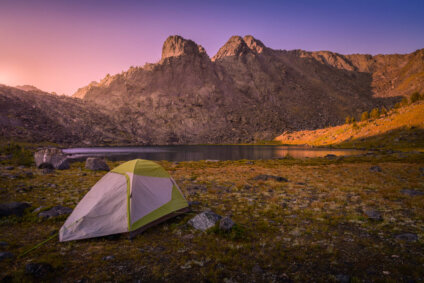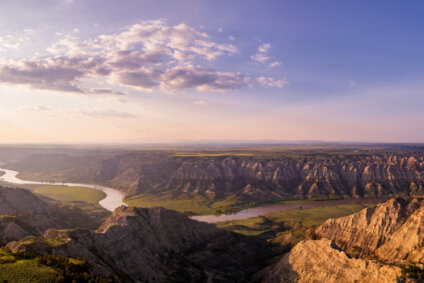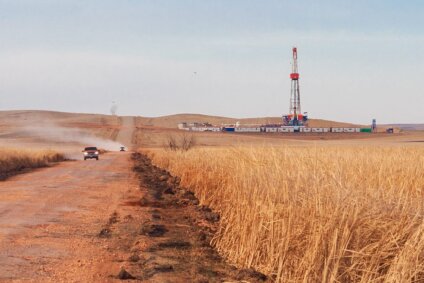A New Environmental Spirit
Let's remember the message of environmental responsibility delivered by the late President Bush on his first visit to Montana
In 1989, nine months into his presidency, President George H.W. Bush made his first presidential visit to Montana. He appeared in September, at the height of the state’s centennial celebration, and spoke from the steps of the State Capitol. (The full speech is available here, and it's worth reading.)
The President made sure to acknowledge the state’s 100th birthday, cracking jokes about recruiting the drovers of the legendary centennial drive to help him wrangle the “herd back on Capitol Hill”, but he quickly pivoted to a topic near to the hearts of Montanans: the state’s natural treasures, its history of environmental leadership, and the responsibility of preserving Montana’s outdoor heritage for future generations.
“The conservation ethic runs deep here,” he told the 18,000 Montanans gathered on the Capitol grounds. “The citizens of the Big Sky State understand that it’s not man against nature – it’s man and nature. The nation and the world can learn from your example. And, believe me, we must learn.”
This wasn’t a politician pandering to his audience. It was the newly elected President of the United States presenting a new vision for a broad set of policies driven by an ethic of conservation, not just in his country but around the world. In this short speech, President Bush laid out a roadmap to a future in which a commitment to conservation was fundamental to America’s global leadership and an essential tenet of our responsibility to future generations.
Perhaps most poignantly, he made a case for the stewardship of our natural treasures not because it was economically or politically beneficial, but because it was the right thing to do. Americans, the President made clear, had a responsibility to the land that sustained us, and Montanans had a role to play as the standard bearers of responsible and forward-thinking stewardship.
“Montanans,” he emphasized, “know more than most how…vital it is for us to accept our responsibilities, our stewardship for the environment in Montana, across America, and around the world. We hold this land in trust for the generations that come after.”
“100 years ago, Montana was a land where man sought the treasure that lay beneath the Earth. And today, it’s the land itself that we treasure – a living legacy we must preserve and pass along. 100 years from now, on the bicentennial of this great state, we want our children’s great grandchildren to enjoy the natural wonders that abound across Montana today. From Glacier down to Yellowstone and out to the Great Plains – we want to know that 100 years from now, that legacy will live on.”
In the vision President Bush presented, stewardship of the land was also a central foreign-policy pillar. “The nations of the world,” he made clear, “must make common cause in defense of our environment. And I promise you this: this nation, the United States of America, will take the lead internationally.”
___________________________________________________________________________________
“Montanans know more than most…how vital it is for us to accept our responsibilities, our stewardship for the environment in Montana, across America, and around the world. We hold this land in trust for the generations that come after. The air and Earth are riches we simply cannot squander.”
– President George H.W. Bush
___________________________________________________________________________________
The President stressed the important of collaborating “with the rest of the world to preserve the planet.” He announced a new initiative bringing the EPA and Peace Corps together to place environmental protection at the forefront of America’s presence in the developing world. He pledged to join forces with nations around the world to curb industrial pollution, fight climate change, and double down on the United States’ pioneering environmental research.
In this vision, a conservation ethic wasn’t an impediment to economic growth, but a pillar of it. “Economic development and environmental stewardship go hand in hand,” said the President. “At the Paris economic summit, we helped the environment achieve the status that it deserves at the top of the agenda for the seven major industrial democracies. And I mean to keep it there right at the top of the agenda.”
That this speech happened in Montana was not an accident. Our state has a long history of conservation, something that was recognized by President Bush and that continues to play a major role in our political landscape today. Our natural treasures – our public lands, wild places, blue-ribbon trout streams, and wildlife populations – are the foundation of our $7 billion outdoor economy, and the bedrock of our outdoor heritage.
As we approach the 2019 legislative session, it’s important that we remember what President Bush made clear nearly 30 years ago – our natural treasures are our common heritage, and we hold them in trust for future generations. That’s not a responsibility we can afford to take lightly, as our public lands continue to come under threat by those would transfer them out of public hands or cede management decisions to out-of-state special interests.
Let’s not forget that we have a responsibility to the people that will come after us, and to the land itself. Our public and wild lands are our legacy, and, in the words of our 41st president, “We want to know that 100 years from now, that legacy will live on.”
– Alex Blackmer, MWA communications coordinator

Stay Connected
"(Required)" indicates required fields


